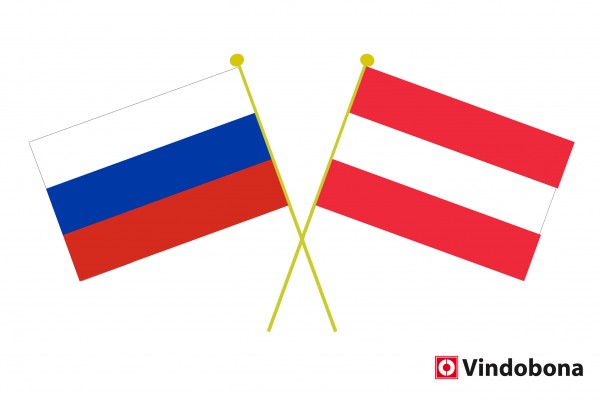Austria's List of Pro-Kremlin Lobbyists Has One Cooperation Partner Less
The Austrian Freedom Party (FPÖ) has announced that it will not extend a memorandum of understanding (MoU) with the United Russia (Единая Россия) party, a nationalist-conservative rallying party. It is the party with the largest membership in the Russian Federation under party leader Dmitry Medvedev, who supports Vladimir Putin's course. However, Russia can still rely on other former Austrian politicians. Read on to see who the most prominent supporters are.
 However, with the termination of the cooperation agreement between the Freedom Party and United Russia expected soon, some well-known Austrian advisors and lobbyists with Russia interests remain. / Picture: © Vindobona.org
However, with the termination of the cooperation agreement between the Freedom Party and United Russia expected soon, some well-known Austrian advisors and lobbyists with Russia interests remain. / Picture: © Vindobona.org
The Austrian Freedom Party does not want to extend the cooperation agreement with Putin's United Russia party, which was concluded by the party leadership at the end of 2016 in Moscow.
"We simply do not need it", party leader Herbert Kickl confirmed at a press conference, according to a report in the daily newspaper "Der Standard".
United Russia holds a constitutional two-thirds majority in the Russian parliament. The party provided Prime Minister Dmitry Medvedev from 2012 to 2020, and he has also been the chairman of United Russia since 2012. Current Russian President Vladimir Putin is not a member of the party. However, the party supports Vladimir Putin's course. De facto, Putin is the party leader.
However, because the FPÖ allowed a notice period to expire in June 2021, the five-year agreement was formally extended to the end of 2026.
The daily newspaper "Die Presse" specifies that the notice period was missed, and therefore formally the "Agreement on Cooperation and Collaboration" of the two parties is currently admittedly still valid until the year 2026.
The FPÖ has in fact missed an envisaged notice period: point 8 of the agreement published at the time stipulates that it will be automatically extended by a further five years if it is not terminated in writing "at least 6 months before the expiry of the relevant period of validity". That would have been necessary at least before June 19, 2021. The FPÖ will approach United Russia to obtain an amicable termination of the agreement at the earliest possible date, a spokesman for the FPÖ parliamentary club said in response to a question from the daily newspaper "Der Presse".
On the occasion of the visit of Russian President Vladimir Putin to Vienna in June 2018, Alma Zadic, then foreign policy spokesperson for the Liste Pilz, already demanded that the Freedom Party immediately cancel the contract with Putin's United Russia party. "It cannot be that another government has even the theoretical possibility to influence Austrian politics by means of a party contract. An active neutrality policy also means that a clear and transparent separation is brought about here."
Credibility is an important factor in foreign policy. Austria should refer to its active and constructive neutrality policy and also address critical points. "If Vice Chancellor Strache calls in advance for lifting EU sanctions against Russia, he is on a collision course with the EU line. Austria thus loses credibility in foreign policy and gambles away its constructive negotiating role," criticized Zadic. "Austria should promote a united and joint action of the European Union in foreign policy issues."
The MoU had been signed in December 2016 in the presence of Heinz Christian Strache, Norbert Hofer, Johann Gudenus and Harald Vilimsky.
In the document, the parties stipulated that they wanted to regularly exchange party delegations at various levels. They also wanted to organize the exchange of experience in legislative activities. They also wanted to support each other in the field of economy, trade and investment.
With the resignations of Gudenus and Strache in the context of Ibizagate, the parties' interest in Russia also declined noticeably.
However, with the termination of the cooperation agreement between the Freedom Party and United Russia expected soon, some well-known Austrian advisors and lobbyists with Russia interests remain.
Austria's ex-Foreign Minister Karin Kneissl, who was Austrian Foreign Minister between 2017 and 2019, has been a board member of Russian state oil company Rosneft since March 2021.
Rosneft, which is on the EU and U.S. Ukraine sanctions list, is owned by one of Putin's closest friends, Igor Sechin, and in 2007 it unjustly took over the assets of Yukos owner Mikhail Khodorkovsky.
Former Finance Minister Jörg Schelling (Austrian People's Party, ÖVP) was an advisor to the Nord Stream 2 project for a few months in 2018, but then stopped engaging in Russia.
The company Nord Stream in the Swiss tax haven of Zug, which built the Baltic Sea pipeline between Russia and Germany (but whose approval is currently pending), is owned by Russian energy giant Gazprom. Gazprom is a Russian multinational energy company, majority state-owned and headquartered in Saint Petersburg, Putin's political home. With sales of more than €140 billion, Gazprom is the world's largest publicly traded natural gas company and Russia's largest company by revenue.
Former Austrian Federal Chancellor (May 2016 to December 2017) and former SPÖ chairman Christian Kern joined the board of Russian Railways RZD in 2019. However, on February 24, 2022, on the day of the Russian invasion of Ukraine, Kern resigned from this post.
Russian Railways is a Russian fully state-owned vertically integrated railway company, both managing infrastructure and operating freight and passenger train services.
Former Austrian Federal Chancellor (2000 - 2007) and former chairman of the Austrian People's Party (ÖVP) Wolfgang Schüssel joined the board of Russian oil company Lukoil in 2019.
Lukoil is a Russian oil company listed on the RTS Index and ranked 98th in the Forbes Global 2000 of the world's largest companies with a stock market value of over $60 billion.



